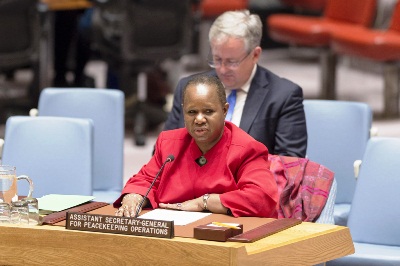UN peacekeeping review urges support for S. Sudan political process
February 28, 2018 (JUBA) – A review of the United Nations peacekeeping operation in war-torn South Sudan requires reaching a political solution to the ongoing conflict is the most effective way to protect civilians, a senior UN official has said.

As documented once again by the Human Rights Council Commission of Inquiry which published its report last Friday, human rights violations and abuses, including horrific incidents of sexual violence, have reached alarming levels, and impunity for these crimes remains the norm, Keita said.
Moreover, over 200,000 internally displaced people continue to be protected on UNMISS bases with the assistance of humanitarian partners, she further stressed.
The review found that largely over 50 percent of the mission’s uniformed personnel are currently devoted to protecting these sites. These sites only cover a fraction of the South Sudanese civilians in need of protection.
“There are no easy answers to this dilemma. There will never be enough troops to protect both the ‘protection of civilians’ sites and extend UNMISS’s protection footprint to other areas of large displacements, in a country as large as South Sudan,” said Keita.
The current environment of Juba, therefore, may call for some adjustment of the RPF mandate, Keita added.
Following the review, the Under Secretary-General for Peacekeeping Operation has ordered a military and police capability study to explore how less troops can be dedicated to the ‘Protection of Civilians’ sites, and more are projected throughout the country to protect other civilians under imminent threat of violence.
UNMISS, according to the official, was established in 2011 as a capacity building tool to assist a Government that lacked the capability to deliver services to its people.
However, following the December 2013 outbreak of violence, UNMISS evolved into a mission where protection of civilians, including from national security institutions, has become the main focus.
“This requirement unfortunately, remains valid,” she stressed, noting that tens of thousands of civilians are estimated to have been killed since the conflict began in December 2013 while over four million have been displaced, half of them into neighbouring nations.
On Monday, there UN agencies jointly warned that 7 million people in South Sudan risk facing severe food insecurity in the coming months without sustained humanitarian assistance and access to those in need.
Particularly at risk, according to the UN joint report, are 155,000 people, including 29,000 children, who are likely to suffer from the most extreme levels of hunger.
Last month, 5.3 million people were already struggling to find enough food each day and were in “crisis” or “emergency” levels of food insecurity (IPC Phases 3 and 4), the newly-released Integrated Food Security Phase Classification (IPC) report stated.
(ST)
